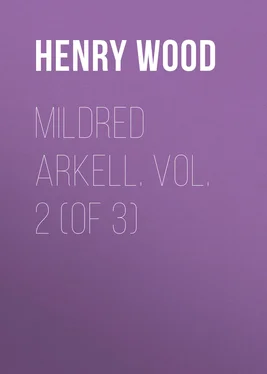Henry Wood - Mildred Arkell. Vol. 2 (of 3)
Здесь есть возможность читать онлайн «Henry Wood - Mildred Arkell. Vol. 2 (of 3)» — ознакомительный отрывок электронной книги совершенно бесплатно, а после прочтения отрывка купить полную версию. В некоторых случаях можно слушать аудио, скачать через торрент в формате fb2 и присутствует краткое содержание. Жанр: foreign_sf, literature_19, foreign_antique, foreign_prose, на английском языке. Описание произведения, (предисловие) а так же отзывы посетителей доступны на портале библиотеки ЛибКат.
- Название:Mildred Arkell. Vol. 2 (of 3)
- Автор:
- Жанр:
- Год:неизвестен
- ISBN:нет данных
- Рейтинг книги:4 / 5. Голосов: 1
-
Избранное:Добавить в избранное
- Отзывы:
-
Ваша оценка:
- 80
- 1
- 2
- 3
- 4
- 5
Mildred Arkell. Vol. 2 (of 3): краткое содержание, описание и аннотация
Предлагаем к чтению аннотацию, описание, краткое содержание или предисловие (зависит от того, что написал сам автор книги «Mildred Arkell. Vol. 2 (of 3)»). Если вы не нашли необходимую информацию о книге — напишите в комментариях, мы постараемся отыскать её.
Mildred Arkell. Vol. 2 (of 3) — читать онлайн ознакомительный отрывок
Ниже представлен текст книги, разбитый по страницам. Система сохранения места последней прочитанной страницы, позволяет с удобством читать онлайн бесплатно книгу «Mildred Arkell. Vol. 2 (of 3)», без необходимости каждый раз заново искать на чём Вы остановились. Поставьте закладку, и сможете в любой момент перейти на страницу, на которой закончили чтение.
Интервал:
Закладка:
It was broad daylight; the sun was shining with all the glorious beauty of a summer morning, shining right into the diligence, and roasting the face of the common-councilman. He rubbed his eyes and wondered where he was. Recollection began to whisper that when he had gone to sleep the previous evening it was dusk, and that ere that dusk had well subsided into the darkness of midnight he had expected to be at his destination, "Gren-haub;" whereas—was he asleep still, and dreaming it?—or was it really morning, and he still in the diligence?—or had some unexampled phenomenon of nature caused the sun to shine out at midnight? What was it? In the greatest perturbation he tore his watch from his pocket, and found it was five minutes past six; but he knew that he was rather slower than French time.
A fine hubbub ensued. Mr. Dundyke startled his wife up in such a fright, that he nearly sent her into fits: he roared out to the coachman, he called for the conductor: he shook the doors, he knocked at the windows: he caused the utmost consternation amongst the quiet passengers in the rotonde and banquette, and woke up a deaf old gentleman in the coupé, who all thought he had gone suddenly mad. The diligence was stopped in haste, and out of the door rushed Mr. Dundyke.
"Where were they taking him to? Why had they not left him at Gren-haub? Did they know he was a common-councilman of the great city of London, a brother of the Lord Mayor and aldermen? How dared they run away with him and his wife in that style? Where were they carrying him to? Were they going to smuggle him off to Turkey or any of them heathen places to sell him for a slave? They must turn round forthwith, and drive him back to Gren-haub."
All this, and a great deal more of it, delivered in the English tongue and interspersed with not a few English expletives, was as Greek to the astonished lookers-on; and when they had sufficiently exercised their curiosity and stared at the enraged speaker, standing there without his hat, stamping his feet in the dust, and gesticulating more like a Frenchman than a stout specimen of John Bull, they all let loose their tongues together, in a jargon equally incomprehensible to the distressed Englishman. In vain did Mr. Dundyke urge their return to "Gren-haub," now with angry fury, now with tears, now with promises of reward; in vain the other side demanded to know what was the matter, and tried to coax him into the diligence. Not a word could one party understand of the other.
"Montez, monsieur; montez, mon pauvre monsieur. Dieu! qu'est-ce qu'il a? Montez, donc!"
Not a bit of it. Mr. Dundyke would not have mounted till now, save by main force. It took the conductor and three passengers to push and condole him in; and indeed they never would have accomplished it, but for the sudden dread that flashed over his mind of what would become of him if he were left there in the road, hatless, hopeless, and Frenchless, while his wife and his luggage and the diligence went on to unknown regions. Some of those passengers, if you could come across them now, would give you a dolorous history of the pauvre monsieur Anglais who went raving mad one summer's morning in the diligence.
There was little haste or punctuality in those old days of French posting—driver, conductor, passengers, and horses all liking to take their own leisure; and it was not far off twelve o'clock at noon, six hours after the morning's incomprehensible scene, and eighteen from the time of departure from Lyons, that the lazy old diligence reached its destination, and Mr. Dundyke discovered that he was in Grenoble. How he would ever have found his way out of it, and on the road to Switzerland, must be a question, had not an Englishman, a young man, apparently in delicate health, who was sojourning in the town, fortunately chanced to be in the diligence yard, and heard Mr. Dundyke's fruitless exclamations and appeals, as he alighted.
"Can I do anything for you?" asked the stranger, stepping forward. "I perceive we are countrymen."
Overjoyed at hearing once more his own language, the unhappy traveller seized the Englishman's hand with a rush of delight, and explained the prolonged torture he had gone through, and the doubt and dilemma he was still in—at least as well as he could explain what was to him still a mystery. "The savages cannot understand me," he concluded politely, "and of course I cannot be expected to understand them."
Neither could the stranger understand just at first; but with the conductor's tale on one side and Mr. Dundyke's on the other, he made out the difficulty, and set things straight for him, and went with him to the diligence office. No coach started for Chambéry, by which route they must now proceed, till the next morning at nine, so the stranger took two places for them in that.
"I'm under eternal obligations to you, sir," exclaimed the relieved traveller, "and if ever I should have it in my power to repay you, be sure you count on me. It's a common-councilman, sir, that you have assisted; that's what I am at home, and I'm going on to be Lord Mayor. You shall have a card for my inauguration dinner, sir, if you are within fifty miles of me. You will tell me your name, and where you live?"
"My name is Robert Carr," said the stranger. "I am a clergyman. I am from Holland."
The name struck on a chord of Mrs. Dundyke's memory. It took her back to the time when she was Betsey Travice, and on a certain visit at Westerbury. Though not in the habit of putting herself forward when in her husband's company, she turned impulsively to the stranger now.
"Have you relations at Westerbury, sir? Was your mother's name Hughes?"
"Yes," he said, looking very much surprised. "Both my father and mother were from Westerbury. I have a grandfather, I believe, living there still. My mother is dead."
"How very strange!" she exclaimed. "Can you come in this evening to us at the hotel for half-an-hour?"
"I would, with pleasure, but I leave Grenoble this afternoon," was the young clergyman's answer. "Can I do anything for you in London?"
"Nothing," said Mrs. Dundyke. "But my husband has given you our address; and if you will call and see us when we get home–"
"And you'll meet with a hearty welcome, sir," interrupted the common-councilman, shaking his hand heartily. "I'm more indebted to you this day than I care to speak."
Mrs. Dundyke watched him out of the yard. He might be about four-and-twenty; and was of middle height and slightly made, and he walked away coughing, with his hand upon his chest.
"David," she said to her husband, "I do think he must be a relative of yours! The Hughes's of Westerbury were related in some way to your mother."
"I'm sure I don't know," said David Dundyke. "I think I have heard her talk about them, but I am not sure. Any way I'm obliged to him ; and mind, Betsey, if he does come to see us in London, I'll give him a right good dinner."
Ah, how little! how little do we foresee even a week or two before us! Never in this world would those two meet again.
And Mr. and Mrs. Dundyke proceeded under convoy to the Hôtel des Trois Dauphins, and made themselves as comfortable for the night as circumstances and the stinging gnats permitted.
Arriving at Geneva without further let or hindrance, David Dundyke, Esquire, and his wife, put up at the Hôtel des Bergues. And on the morning afterwards, when Mrs. Dundyke had dressed herself and looked about her, she felt like a fish out of water. The size of the hotel, the style pervading it, the inmates she caught chance glimpses of in the corridors, were all so different from anything poor humble Betsey Dundyke had been brought into contact with, that she began to feel her inferiority. And yet she looked like a lady, in her good and neat dress, and her simple cap half covering her fair and still luxuriant hair. Her face was red, tanned with the journey; but it was a pleasing and a nice face yet to look upon.
Читать дальшеИнтервал:
Закладка:
Похожие книги на «Mildred Arkell. Vol. 2 (of 3)»
Представляем Вашему вниманию похожие книги на «Mildred Arkell. Vol. 2 (of 3)» списком для выбора. Мы отобрали схожую по названию и смыслу литературу в надежде предоставить читателям больше вариантов отыскать новые, интересные, ещё непрочитанные произведения.
Обсуждение, отзывы о книге «Mildred Arkell. Vol. 2 (of 3)» и просто собственные мнения читателей. Оставьте ваши комментарии, напишите, что Вы думаете о произведении, его смысле или главных героях. Укажите что конкретно понравилось, а что нет, и почему Вы так считаете.












